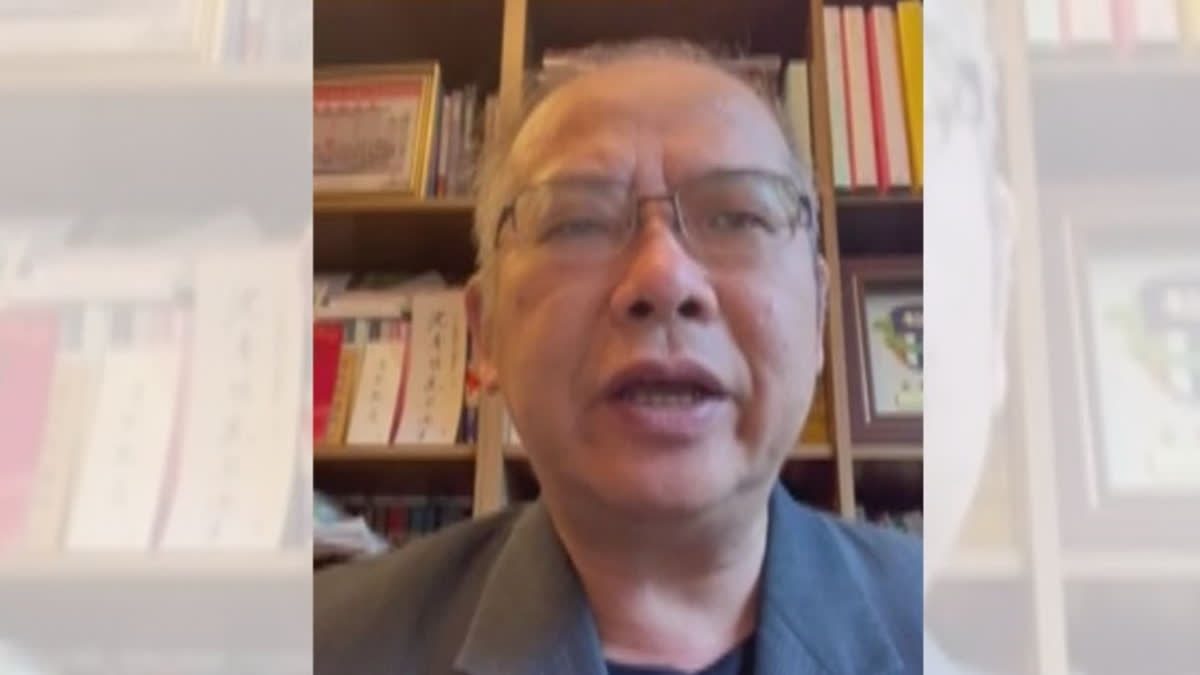New Delhi: With an attempt to invade Taiwan, China is leaving no stone unturned to flex its military muscle over the island. However, in the face of potential Chinese invasion of Taiwan, the key question remains- What would India do? Given its growing concern for Chinese belligerence in the Indo-Pacific, ETV Bharat spoke to Taiwanese defence expert Dr Shen Ming Shih to understand the political and military consequences of a potential Chinese invasion of Taiwan.
Dr Shen Ming-Shih is the Director of the Division of National Security Research and Acting Deputy Chief Executive Officer at the Institute for National Defense and Security Research (INDSR) in Taiwan. He said, "India will hesitate at the beginning when China invades Taiwan, hoping to have the opportunity to seek its own interests, but if India finds out that after Taiwan is occupied, China's next target will be the Sino-Indian border, and it will be vigilant".
Also read: China's plans to build a new embassy near the Tower of London stall amid local opposition
He further said, “In the face of war, there is also an opportunity for India to take advantage of the interests of the west side of China. Either cooperate with the United States and Western countries to jointly sanction to China or form a democratic alliance to put pressure on China and cause China to collapse."
"India must prepare as soon as possible, not wait until Taiwan is annexed. It must see China's true intentions towards India, prepare the defense early, use a strong military capability to deter China from invading, and strengthen cooperation with democratic countries. Because a dictatorial and powerful communist country is a disaster for India and the world,” the Taiwanese defense expert warned.
Recently, in a diplomatic signal to China, the three retired chiefs of Armed Forces - Admiral Karambir Singh, Air Chief Marshal RKS Bhaduria, and General Manoj Naravane — of the Indian Navy, Air Force, and Army, respectively, were in Taipei to discuss the Indo-Pacific security, to engage with various sections of the Taiwanese leadership and to present Indian military's view on how to deal with the sudden crisis. The visit by the three retired chiefs comes after Taiwan claimed that 10 Chinese aircraft, accompanied by five Chinese warships, entered its airspace and engaged in 'combat readiness' patrols.
Although, India follows the 'one China policy' and does not have a formal diplomatic ties with Taiwan yet, the crucial visit by the three former chiefs was seen by many as a sign of change in India's stance, especially if China invades Taiwan.
Also read: Explainer: Why Taiwan is setting up another TECC in India
Furthermore, the Taiwanese defense expert explained that based on the great rejuvenation of the Chinese nation and the need to continue his fourth term, Chinese President Xi Jinping realizes the unification of Taiwan will be the critical milestone. But its ways include peaceful unification and unification by force. If Taiwan does not accept peaceful reunification, Xi will force Taiwan to surrender by force, or destroy Taiwan by force.
“In recent years, the continuous display of force around Taiwan is a kind of military coercion. This method of forcing other states to fear and submit is rogue and hegemonic behavior. In fact, it can also be seen on the Sino-Indian border. Taiwan will not give in. In addition to its own strong military resistance, Taiwan also hopes to get help from the international community. Because the democratic development, geostrategic values and supple chains, international society will support Taiwan”, the expert added.
When asked if India should formulate policy to prepare itself of a hot war over Taiwan, Dr Sheng Ming Shih opined that India should adopt a new policy, referring to the Taiwan Relations Act of the United States, advocating that Taiwan is not part of China, and for the sake of regional stability opposing the two parties changes the status quo unilaterally.
“This argument can also be applied to the Sino-Indian border. Both Taiwan and India are democratic countries. Although they are far apart, there are many opportunities for cooperation in the face of the common enemy China. For example, there are many opportunities for the military intelligence of the PLA, defense industry cooperation, military personnel exchanges, joint military training. India and Taiwan need to join the ally of the democratic states to fight against the Communist Party.
"However, India has become the biggest country, so it should not worry too much about China. Instead, it should understand China's weaknesses through Taiwan, and let the Chinese Communist regime decline and perish”, said Dr Sheng.
In recent years, it is seen that India and Taiwan have been boosting strategic cooperation to counter China's hegemony in the Indo-Pacific. However, to deal with possible conflict between China and Taiwan, New Delhi must push for greater cooperation with the island nation in various sectors especially when the latter is emerging as an advanced technology production house.
New Delhi must possibly work together with Quad partners and apprise them about its constraints and expectations and thereby ramp up Quad's efforts to keep Taiwan free of invasion just as it expects support to counter China's aggression at the border.



